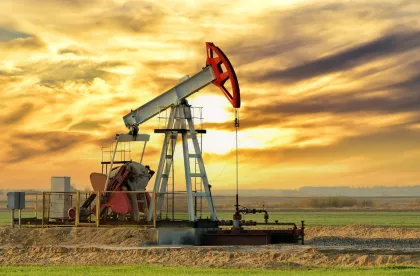Two decades of collective breath-holding was finally released with the enactment of the Petroleum Industry Act (PIA), making 2021 a notable year for Nigerian oil and gas. We give our snapshot of the year’s main events in Nigeria’s upstream petroleum sector. Beyond the PIA, 2021 saw the conclusion of a marginal field bid round, significant divestment process by the Majors, and a renewed focus on gas. We also consider what we can expect in 2022, including the next steps in PIA implementation.
2021: What happened in legal matters?
The PIA loomed large over everything else in 2021 and was enacted into law by President Buhari in August. The scale of the changes introduced by the PIA is widespread and profound – it is a root and branch overhaul of the administrative, regulatory and fiscal regime, as well as the key petroleum institutions. The key upstream changes are:
-
Fundamental reform of the petroleum institutions: Creation of a new upstream regulator, the Nigerian Upstream Petroleum Regulatory Commission, replacing DPR. It establishes a new “NNPC Limited” and seeks to transition NNPC to be a commercial entity that is not dependent on Government support.
-
Grandfathering of existing upstream licences until their conversion to the new PIA regime: Existing OPLs and OMLs continue on their present terms and only certain PIA terms apply to them (but not the new fiscal terms). Conversion to the new PIA terms happens either voluntarily or mandatorily on licence renewal, with changes to the existing terms only applying from conversion. Conversion triggers significant relinquishment requirements, and the abandonment of related litigation proceedings (on a voluntary conversion).
-
General reduction in the taxation and royalty-take of new / converted licences: The extent of the reduction varies dependent on the nature of the acreage and whether it is freshly granted or converted pre-PIA acreage (with onshore / shallow water joint venture acreage receiving the biggest net reduction). The new fiscal regime only applies to existing licences from conversion.
-
Establishment of a new host community development trust structure: This entails payment of a 3% levy and the creation of community trusts to initiate local projects, as well as the transfer of existing community projects. Operators have until August 2022 to establish these trusts.
-
Companies must segregate their upstream, midstream and downstream operations: Midstream (and any downstream) activities that were being carried out as part of upstream operations will require the grant of new a midstream / downstream licence within 18 months.
There is a lot required to implement the PIA but the initial steps have been taken: the new upstream authority, the Nigerian Upstream Petroleum Regulatory Commission, was constituted in October. The new NNPC Limited has been incorporated, with Senator Margret Chuba Okadigbo appointed as chair and Mele Kyari continuing as CEO. We await more details about the mechanism for transferring the old NNPC’s assets, contracts and liabilities to the new NNPC Limited.
Beyond the PIA, there were high-profile courts cases related to Nigerian matters. A developing theme over recent years has been the possible liability of parent companies for the activities of their subsidiaries in Nigeria. In February, the UK Supreme Court held that the High Court in London had jurisdiction to hear a case involving group claims brought against Royal Dutch Shell Plc and its Nigerian subsidiary in connection with alleged pollution in the Niger Delta. There was an arguable case that Shell had taken over the management, or jointly managed, the relevant activity of its Nigerian subsidiary and it was reasonably arguable that the UK domiciled Shell parent company owed a duty of care to the Nigerian claimants. This followed a case brought by Nigerian claimants in the Dutch courts which resulted in Royal Dutch Shell Plc’s Nigeria unit being ordered to provide compensation.
What happened in politics / regulatory matters?
The continued global pandemic and wave of oil thefts and attacks on oil and gas infrastructure in Nigeria made for another challenging year for President Buhari.
Nigeria concluded the 2020 marginal field bid round with the award of rights to develop 57 marginal fields made to indigenous oil and gas companies, including Matrix Energy, Shafa Exploration and Vhelblerg Exploration. It remains unclear how many awards have proceeded to an actual farm-out. Under the PIA, marginal fields are set to receive their own separate form of licence. This closes the longstanding query about the legal status of marginal fields and the potential consequences of the expiry of their establishing OML, which may help with the financing of these fields.
President Buhari launched the “Decade of Gas” at the Nigeria International Petroleum Summit in March, with a plan to power Nigeria with gas by 2030. Progress was made on a number of key gas projects. Seplat Energy completed its funding for the ANOH gas processing plant, one of the Government’s Seven Critical Gas Development Projects, early in 2021. Construction began in June on Nigeria LNG’s Train 7 project which promises to increase LNG production capacity by 35%. NNPC also announced the start of the US$ 25 billion Nigeria-Morocco gas pipeline project which is intended to deliver gas from Nigeria to 13 countries in West and North Africa.
Nigeria also awarded its first FLNG licence in 2021 with UTM Offshore expected to install a 1.2 million tons per annum FLNG unit at the Yolo field. UTM Offshore and African Export-Import Bank signed a MoU in December to raise $5 billion to finance the development of the FLNG project.
During the COP26 summit, Buhari pledged Nigeria’s commitment to reach net zero by 2060, highlighting the crucial role of gas in the energy transition for Nigeria.
What deal activity happened?
Total completed the sale of its 10% interest in OML 17 to Nigerian company TNOG Oil & Gas Limited for approximately $180 million at the start of the year, giving TNOG Oil & Gas Limited a total interest of 45%. 2021 saw the return of the Majors selling down significant Nigeria positions, with ongoing sale processes and new divestments announced – in July, Shell launched the sale of its Nigerian subsidiary Shell Petroleum Development Company of Nigeria Limited, one of Nigeria’s biggest upstream companies and which holds a 30% interest in its shallow and onshore assets.
NNPC showed its capacity to buy assets and agreed to purchase Chevron’s 40% stake in OML 86 and OML 88.
What is expected in 2022?
-
Legal: Industry participants must now get to grips with the new PIA regime. Two of the most immediate requirements are the creation and funding of host community development trusts (which must be done by August 2022) and the opening of abandonment escrow accounts and preparation of abandonment plans (where no clear deadline is apparent). To convert or not convert to PIA licences will be the question facing many licence holders and the conclusion of the first pathfinder conversion process is eagerly anticipated.
-
Politics / regulatory: 2022 is Buhari’s last full year as president and electioneering will be underway. Political matters will come to the fore as the search for the President’s successor intensifies and may lock up Government approvals in petroleum matters towards the end of 2022.
-
Deal activity: Many Majors continue to progress sizeable divestments of onshore and offshore acreage with leading Nigerian E&P companies the front runners as buyers. The scramble to find financing for these transactions will intensify. Transactions will need to sign in time to seek Government approvals before officeholders start campaigning. Our prediction: 2022 will see domestic companies holding more Nigerian acreage than IOCs.
-
Projects: The Dangote refinery promises to be operational by early 2022, following delays due to the COVID-19 pandemic. Significant gas projects should make progress: Seplat Energy expects to start its part of the ANOH processing project by the middle of 2022. Further progress is also anticipated on the $1.4 billion OCP fertilizer project and $2.8 billion AKK gas pipeline project (reportedly on course for completion in 2023). Such infrastructure is key to unlocking Nigeria’s vast gas reserves.




 />i
/>i

